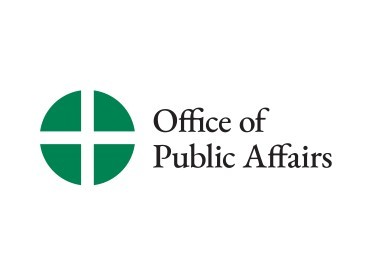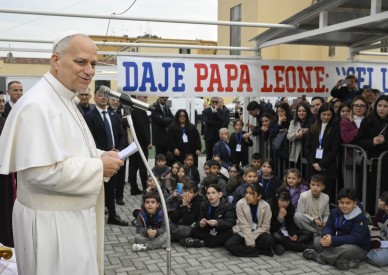The best of the USCCB,
right in your inbox
Sign Up for Our Email Newsletter
The Office of Government Relations (OGR) represents the USCCB before the U.S. Congress on public policy issues of concern to the bishops. OGR coordinates and directs the legislative activities of the USCCB staff and other church personnel to influence the actions of the Congress. A specific set of issues is assigned to each congressional liaison staff person, who in turn, works in collaboration with particular policy departments at the USCCB.
The USCCB actively monitors all federal legislation relating to elementary and secondary education. As the Church's representative for Catholic elementary and secondary schools in the United States, the USCCB supports policies that recognize the right of parents to be the primary educators of their children. We also advocate for legislation that assists parents in defraying the costs of choosing the type of schooling most appropriate for their children, including education in Catholic schools. The USCCB works to ensure that all students, regardless of where they attend school, share federal benefits and services equitably.
Learn more about the USCCB's Committee on Catholic Education.
The USCCB is committed to ensuring religious presence in mass communications, removing barriers to communication, preserving the public's access to information, and the right to freedom of speech for everyone. We are also committed to eliminating the presence of pornography and violence in the media, with special emphasis on protecting children, along with providing higher quality programming, providing Catholic information and educational programming, and promoting diversity in ownership of communications outlets.
Learn more about the USCCB's Committee on Communications.
The USCCB works to apply Catholic social teaching to domestic issues in the public policy arena. Under the leadership of the Domestic Policy Committee of the Conference of Bishops, the USCCB advocates on behalf of the poor and vulnerable on a wide range of legislative matters to promote family and child-friendly policies, access to health care, the preservation of rural life, the reformation of welfare policies, and the consideration of issues of poverty.
Learn more about the USCCB's Committee on Domestic Justice and Human Development.
The USCCB engages in policy development and advocacy on concerns related to international justice and world peace. We support public policies which promote human rights and religious freedom globally; encourage international assistance, peace and disarmament; and reduce and resolve violent conflicts. We also strive to reduce global poverty through effective international assistance, debt relief for the poorest nations, and just trade policies. In addition, we work to alleviate human suffering through morally appropriate health programs, eradication of land mines and other indiscriminate weapons, and various initiatives. The USCCB works closely with our partner organization, Catholic Relief Services, to advocate on behalf of morally sound foreign policies to protect the life and dignity of poor and vulnerable persons throughout the world.
Learn more about the USCCB's Committee on International Justice and Peace.
The USCCB stands firm in its support for marriage which is, and can only be, a faithful, exclusive, lifelong union of one man and one woman and must remain such in law. We oppose efforts to make any other personal relationship the equivalent of marriage in law, regulation, or any other public policy. We will continue to support the Defense of Marriage Act (DOMA) and oppose measures that seek to redefine or erode the meaning of marriage. The family—based on marriage between a man and a woman—is the first and fundamental unit of society and is a sanctuary for the creation and nurturing of children and it should be defended and strengthened. We will seek to reinforce respect for the family and to uphold the rights and responsibilities of mothers and fathers to care for their children.
Learn more about the USCCB's Committee on Laity, Marriage, Family Life and Youth.
The USCCB works to ensure that persons fleeing persecution and other affronts to the dignity of the human person have special standing for relief and that family reunification remains a cornerstone of the U.S. immigration system. The USCCB supports legislation that would comprehensively reform our nation’s immigration laws, as well as legislation designed to make incremental improvements, especially measures that provide increased opportunities for immigrants to legally enter or remain in the United States and the ability for longtime undocumented residents to regularize their status. The USCCB commonly evaluates legislative and policy proposals based on how well they provide for: newcomers to be welcomed, protected, promoted, and integrated; immigration and humanitarian processes to be accessible and fair; access to the right to work and live free of exploitation; and respect for the dignity and due process rights of noncitizens impacted by enforcement efforts. The USCCB devotes particular attention to protecting the most vulnerable, such as unaccompanied children, refugees, asylum seekers, and victims of human trafficking.
Learn more about the USCCB's Committee on Migration.
The USCCB advocates for policies that protect and respect human life and dignity, with special concern for those who are unborn, disabled, or terminally ill. We seek to eliminate legalized abortion, ultimately through a constitutional amendment; we oppose legalization of assisted suicide or euthanasia and the use of controlled substances to take human life; we advocate better pain management and other care for persons with disabilities and terminal illnesses; we support policies encouraging childbirth over abortion and assistance to children and pregnant women; we oppose domestic and foreign abortion funding as well as efforts to force states and health plans to fund abortion and other services to which many have moral and religious objections; and we support medical research that respects human life, while opposing human cloning and harmful experiments on human embryos.
Learn more about the USCCB's Committee on Pro-Life Activities.
The USCCB has a deep interest in legislation and policies that impact the religious liberty of both individuals and institutions. In particular, the USCCB supports legislation that prevents government intrusion into religious doctrine, worship or governance, as well as legislation that facilitates appropriate collaborations between public and religious entities. We support the legal protection of conscience for individuals and faith-based organizations so that they are not forced or pressured to abandon their religious principles, including when they participate in government programs which serve the poor and vulnerable both here and abroad, educate children, and provide health care. The USCCB also carefully monitors legislation and policies dealing with the regulation of tax-exempt entities. In this context, the USCCB supports efforts to protect and promote incentives for charitable giving and public assistance to programs carried out by nonprofit church-related entities.
Learn more about the USCCB's Committee for Religious Liberty.
Sign Up for Our Email Newsletter

The U.S. bishops’ annual Catholic Relief Services Collection helps those in need in the United States and worldwide by benefiting six agencies and off...

During a parish visit in his Diocese of Rome, Pope Leo XIV went to a working-class neighborhood that has been facing rising criminal activity and incr...

"My brother bishops and I unite our voice with our Holy Father and make the heartfelt appeal to all parties involved for diplomacy to regain its prope...